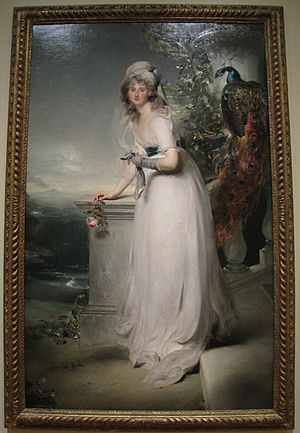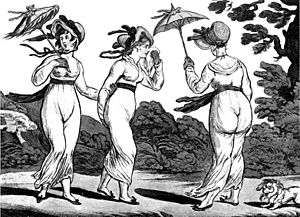William Tollemache, Lord Huntingtower (1766–1833) facts for kids
Quick facts for kids William Tollemache |
|
|---|---|
| Lord Huntingtower | |
|
|
|
| Reign | 1793–1833 |
| Successor | Lionel Tollemache, 8th Earl of Dysart |
| Spouse(s) | Catherine Gray, Lady Manners |
| Issue | |
| Hon. Louisa Tollemache Lady Catherine Camilla Tollemache Lady Emily Frances Tollemache Lionel Tollemache, 8th Earl of Dysart Felix Tollemache Hon. Arthur Caesar Tollemache Hon. Caroline Tollemache Lady Catherine Octavia Tollemache Hugh Tollemache Frederick Tollemache Algernon Tollemache Lady Laura Maria Tollemache |
|
| Noble family | Tollemache |
| Father | John Manners |
| Mother | Louisa Tollemache, 7th Countess of Dysart |
| Born | 19 May 1766 |
| Died | 11 March 1833 |
William Manners Tollemache, Lord Huntingtower (born May 19, 1766 – died March 11, 1833) was an important British nobleman and Tory politician. He was also known as Sir William Manners, Bt for a period. He came from a well-known family and played a role in British politics during his lifetime.
Contents
About William Tollemache
William Manners Tollemache was born William Manners. He was the oldest son of John Manners and Louisa Tollemache, 7th Countess of Dysart. His mother was a Countess, which meant she held a high noble title.
Early Life and Titles
When William was 26 years old, on January 12, 1793, he was given the title of Baronet. This made him Sir William Manners, Bt. This title was connected to Hanby Hall in the County of Lincoln.
Later, in 1821, his mother became the Countess of Dysart. At this point, William was given the special title of Lord Huntingtower. He also changed his last name to Talmash or Tollemache to match his mother's family name.
His Time in Politics
Lord Huntingtower was known for his strong influence in the political elections for the town of Ilchester in Somerset. He owned a lot of property in the area. This meant he had a lot of power over who got elected.
He served as a Member of Parliament for Ilchester from 1803 to 1804 and again from 1806 to 1807. In 1818, the people he wanted to win the election did not get enough votes. After this, he had the local workhouse torn down.
A workhouse was a place where poor people could live and work. When it was torn down, many people were left without a home. A report to Parliament said that 163 people, including babies and elderly people, were forced out. They had nowhere to go, especially during a very cold winter. Some found straw in the town hall, while others had to sleep outside. Even pregnant women were among those affected.
Despite this, Parliament did not offer any help to the people. However, during a very harsh winter in 1828–1829, Lord Huntingtower started a big project to help people. He hired 528 workers near his estates in Buckminster in Leicestershire. This project provided jobs and relief during a difficult time.
He also held the important position of High Sheriff of Leicestershire in 1809. This role involved keeping law and order in the county.
Family Life


On January 12, 1790, William Tollemache married Catherine Rebecca Gray. She passed away in 1852. Together, they had 12 children: six sons and six daughters.
Their children were:
- Hon. Louisa Tollemache (1791–1830)
- Lady Catherine Camilla Tollemache (1792–1863)
- Lady Emily Frances Tollemache (1793–1864)
- Hon. Lionel Tollemache, 8th Earl of Dysart (1794–1878)
- Hon. Felix Thomas Tollemache (1796–1843)
- Hon. Arthur Caesar Tollemache (1797–1848)
- Hon. Caroline Tollemache (1799–1825)
- Lady Catherine Octavia Tollemache (1800–1878)
- Hon. Hugh Francis Tollemache (1802–1890)
- Hon. Frederick James Tollemache (1804–1888)
- Hon. Algernon Gray Tollemache (1805–1892)
- Lady Laura Maria Tollemache (1807–1888)
After his son Lionel became the Earl of Dysart, Lionel's brothers and sisters were given special recognition. This meant they were treated with the same high rank as the children of an Earl. This happened on November 6, 1840.
Lord Huntingtower suffered a stroke at Buckminster Park on March 7, 1833. He passed away a few days later, on March 11.
Images for kids
-
Portrait of Catherine Gray, Lady Manners, by Thomas Lawrence. Cleveland Museum of Art, Ohio.
-
The Graces in a High Wind by James Gillray, believed to be Louisa, Emily and Catherine Manners.
 | Jackie Robinson |
 | Jack Johnson |
 | Althea Gibson |
 | Arthur Ashe |
 | Muhammad Ali |



